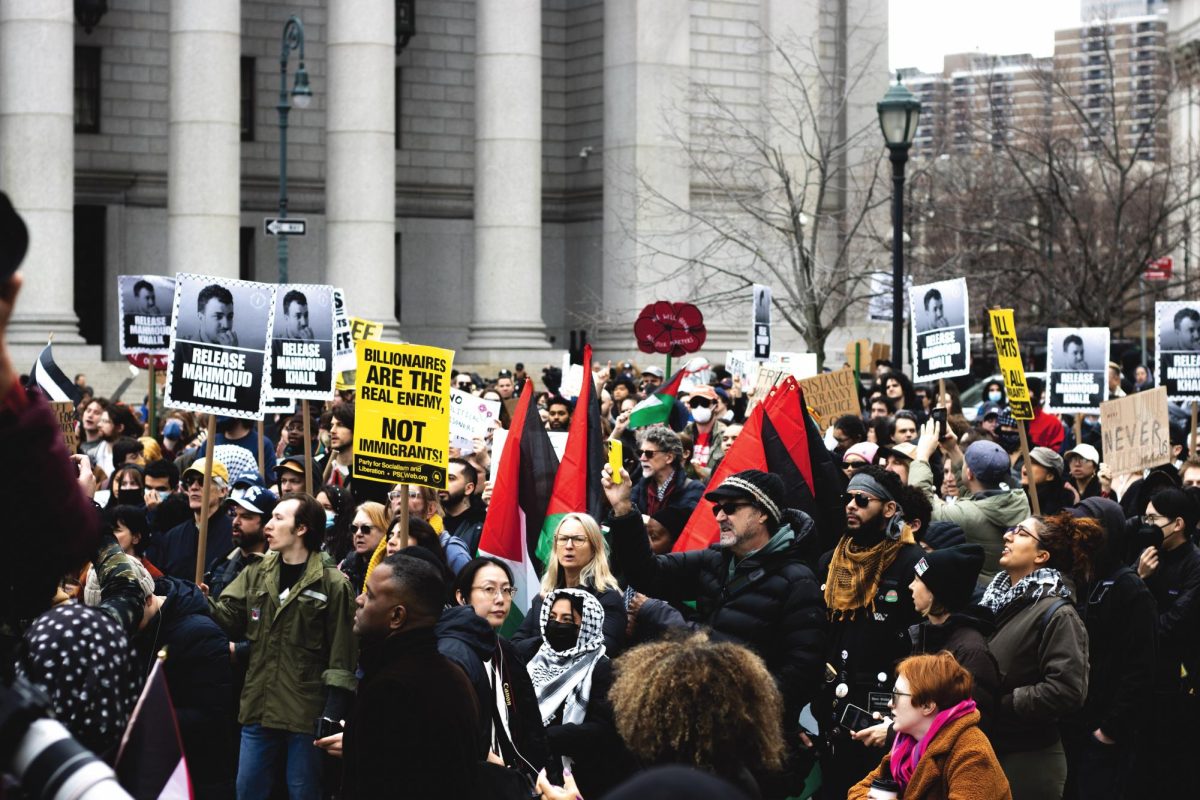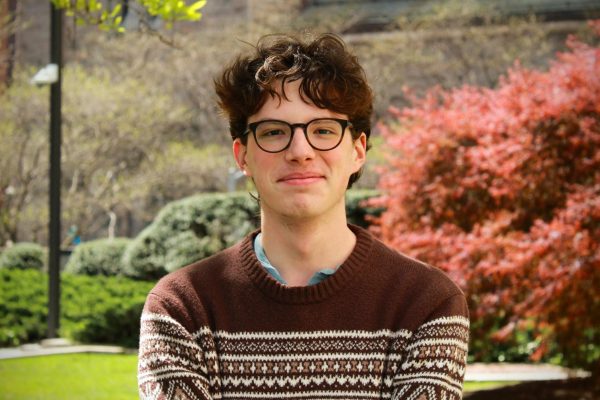The detainment of Columbia University student Mahmoud Khalil represents an alarming meeting of pro-Zionist and anti-immigrant rhetorics that have become normalized in American politics. It is particularly alarming to see educational institutions become the first battleground in a new push against dissent. The federal government’s political repression on university campuses gives insight into how repression will manifest elsewhere.
The United States government has a storied history of political repression. While backing coups against democratically elected officials abroad and surveilling civil rights leaders at home, our government has maintained its so-called “commitment to freedom.”
Born in a Palestinian refugee camp in Damascus, Syria, Mahmoud Khalil is a Columbia graduate student and a permanent resident of the United States. He was detained by Immigration and Customs Enforcement on March 8 and is being held in Louisiana without a criminal charge.
The federal government’s political repression on university campuses gives insight into how repression will manifest elsewhere.
Khalil led negotiations during pro-Palestinian protests on Columbia’s campus, which the Department of Homeland Security (DHS) described as having “led activities aligned to Hamas.” Badar Khan Suri of Georgetown University has also been detained due to his marriage to Palestinian student Mapheze Saleh, who U.S. authorities allege to have connections to Hamas. Additionally, Rasha Alawieh of Brown University was deported to her native Lebanon. The DHS characterized her attendance at Hezbollah leader Hassan Nasrallah’s funeral in Beirut as explicit support for Hezbollah. None of them did anything remotely illegal, but they have all been labeled as terrorists.
Others at Columbia who have been targeted include undergraduate Yunseo Chung and Ph.D. student Ranjani Srinivasan. Chung got an initial win from a lawsuit she began against government officials after she was almost deported, while Srinivasan fled to Canada.
Terrorism in America is a distinctly political rather than moral label. A paper published in the Fordham Law Review describes the “persistent discriminatory stereotype of the Muslim terrorist.” The stereotype was pervasive after 9/11, precipitating hate crimes such as the murder of Balbir Singh Sodi. A moral condemnation of terrorism would imply concern for innocents — major civilian casualties in the American “war on terror” do not receive nearly the same attention. Now, public resistance to Israel is labeled “terrorism” by the United States government.
The Trump administration has justified its crackdown with a provision of the Immigration and Nationality Act of 1952, stating that “An alien whose presence or activities in the United States the Secretary of State has reasonable ground to believe would have potentially serious adverse foreign policy consequences for the United States is deportable.” The very presence of a clause in U.S. law allowing for arbitrary deportation is absurdly problematic, and the critical point is defining “serious adverse foreign policy consequences.”
“Undocumented immigrant” has become a buzzword for some mythical group coming to steal jobs and commit crimes.
Anti-Zionist political expression — against the political formation of the Israeli state, specifically regarding the subjugation of Palestinians — has gained ground in the past two years. Instead of addressing widespread condemnations of Israel’s genocide of Palestinians (as defined by Amnesty International), the U.S. government has characterized any criticism of Israel as antisemitic discrimination. Politicians of both parties passed the House resolution codifying such a blatant distortion of the truth, and now its effects are becoming clear. All three of the people above arrived in America via legal means and are now facing deportation for dissent with the U.S. government.
Nativist rhetoric has been on the rise in the United States for the past decade. President Donald Trump has consistently characterized immigrants as violent and dangerous on his way to winning two presidential terms. His opponent in the 2024 election, former Vice President Kamala Harris, also promised to continue “cracking down” on immigration. Both dehumanize immigrants completely by assuming immigration to be a danger to national security. Khalil, Khan Suri and Alawieh all had visas or green cards. If such legal status does not guarantee safety from arbitrary expulsion, then undocumented immigrants face almost insurmountable obstacles to a life well lived. “Undocumented immigrant” has become a buzzword for some mythical group coming to steal jobs and commit crimes. Immigration policy in the United States exhibits a similar departure from reality to foreign policy in Israel.
By creating arbitrary associations in the minds of Americans — immigrants as criminals, pro-Palestinian activists as terrorists — the government dehumanizes innocent people and legitimizes violence against them.
The U.S. government gives away the game by linking antisemitism to foreign policy interests. Any assertion of Palestinian humanity, in defiance of the Israeli state, is deemed “fomenting anti-Semitism” or “supporting Hamas.” Never mind that “Semite” refers to a collection of ethnic groups, or what it means for Hamas to be designated “terrorists” in the face of Israel’s mounting crimes: the real danger in the American government’s eyes is anti-Zionism. Secretary of State Marco Rubio said explicitly on social media that the US government “will be revoking the visas and/or green cards of Hamas supporters in America so they can be deported.”
Organizations such as Jewish Voice for Peace have sought to re-establish the distinction between ethnic discrimination and opposition to colonial apartheid a million times over, but many Americans remain ignorant. Instead, speaking out against genocide is somehow a threat to American life.
In order to concretize punitive narratives based on misconceptions, reactionaries have targeted American education. Last spring, The Washington Post charted the starkly restrictive character of education reforms in red states. At earlier stages of childhood education, leaving decisions up to the states has proven effective for conservatives. Given Trump’s executive order on March 20 calling for the dissolution of the Department of Education, the planned regression of American education is continuing apace. The university should stand apart as a haven of free thought, allowing for intellectual exploration beyond the preferences of a given presidential administration.
Khalil specifically was one of the faces of pro-Palestinian activism at Columbia, and according to the New York Times, ICE moved to detain him after a protest on March 5 following the expulsion of pro-Palestine Barnard students.
Instead, universities are kneeling to reactionary political pressure. Khalil, Khan Suri and Alawieh were all established at their respective institutions. Khalil specifically was one of the faces of pro-Palestinian activism at Columbia, and according to the New York Times, ICE moved to detain him after a protest on March 5 following the expulsion of pro-Palestine Barnard students. Notably, Khan Suri and Alawieh were not publicly active whatsoever.
Visiting horrific consequences upon any academic even vaguely tied to anti-Zionism creates a chilling effect on campuses. For university students and faculty, the definition of pro-Palestinian speech as hate speech presents a constant professional — i.e. economic — threat. For lower-income students facing steeper tuition fees each year, the stakes could easily prevent them from protesting. The Trump administration recognizes the threat of student protests in affecting social change; Khalil himself wrote from jail on March 18 that “even if the public has yet to fully grasp it, it is students who steer us toward truth and justice.”
The Trump administration drives a hard bargain, having recently coerced Columbia and threatened the University of Pennsylvania (UPenn) with losses of hundreds of millions of dollars if they fail to enact specific draconian rules. In Columbia’s case, they hired 36 “special officers” to police students on campus and codified a definition of antisemitism. For UPenn, the administration wants them to ban transgender athletes, once again attempting to entrench and institutionalize reactionary rhetoric against a marginalized group. It seems colleges across the country can only hope for pyrrhic victories.
That said, university administrators nationwide were entirely too punitive with pro-Palestine protesters on campus. Fordham’s own administration called police on peaceful protesters, arresting 15 people on May 1. In his letter from jail, Khalil described how “Presidents Shafik, Armstrong, and Dean Yarhi-Milo laid the groundwork for the U.S. government to target me by arbitrarily disciplining pro-Palestinian students and allowing viral doxing campaigns — based on racism and disinformation — to go unchecked.” Surveillance creates a disciplinary effect in the minds of students. If you are always watched (e.g. by a special officer), your behavior is perpetually subject to evaluation and potential regulation. Students will continue to agitate for necessary social change, but the government will do its best to silence free speech.
In his “Postscript on the Societies of Control,” philosopher Gilles Deleuze predicted “continuous forms of control” in the school system and “the corresponding abandonment of all university research.” If the government is allowed to systematically target groups and discipline collegiate communities into obedience, then the United States faces a bleak future. Political organizing, agitation and research must all continue, as they are the key behaviors under attack.



